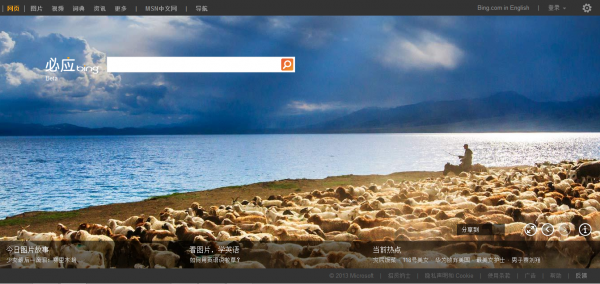What is Bing's China problem?

A few weeks ago, while doing a bit of research for a story, I had occasion to visit the Bing search page. More importantly to this article, it was the Chinese version of Bing. Over the following days I forgot about this brief foray into Asia, but my web browser remembered.
When I return to Bing several days later I am defaulted to the China site -- it still says I am on www.bing.com, but all information is displayed in Chinese characters, which Chrome helpfully translates on the fly. I close the tab, re-open and try again with the same results. I close Chrome and try again -- still nothing.
After a few days (I do not use Bing often, though I do like it) I recall my trip to Bing.cn. I then check the cookies in my browser and find the site has set several of them -- c.bing.com, Bing.com.cn and dict.bing.com.cn. Interesting. I delete all of them and Bing returns to normal. Then, perhaps because I am both adventurous and stupid, I recreate the steps and the same results occur. I try both Firefox and Internet Explorer and again the same thing.
More interesting to this sordid little tale is that search results using Bing.cn are only somewhat different. I say "interesting" because I expected "somewhat" to actually be "radically". I delete the Firefox cookies and begin comparing the same terms side-by-side. For instance, a search for Tianenman Square on Bing.cn results in two travel sites being ranked at the top, with a Wikipedia article about the protests at number three. Bing.com ranks the Wikipedia story at the top of the page.
Other searches also result in similar outcomes, with rankings in different orders -- Dalai Lama, Nepal (which completely strips out a U.S. Department of State travel advisory), Democracy and Freedom. The latter results in a Baidu article that begins "Freedom which is the name of Akon's latest solo album" at the top, versus a link to a web site offering debt consolidation (Bing fails in both cases on this).
I also check "safe search" settings. The short story of which is that it does not exist. Or, more to the point, it does and it cannot be turned off. I find only the following message (translated):
"This setting will filter out adult content. If you are viewing adult material, please let us know so that we can in the future to filter out. For more information about your country / region safe search requirements".
The results, while re-ordered and somewhat stripped down, are not as devoid of real information as I had expected. Perhaps this is due to my actual location, which is not going through a filter -- well, maybe but that is another story.
If setting these cookies is the price of doing business behind the Great Firewall then I could give Microsoft's search engine a pass, but a visit to Google.cn does not result in this settings change. This leaves me to wonder why the Redmond, Wash.-based company feels the need to track this information and, more importantly, what it is doing with those databases. Support for Chinese censorship?